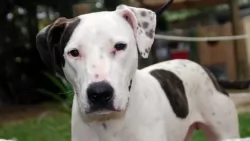 MyDogBreeds
MyDogBreedsBull Arab is originated from Australia but Aussie Poo is originated from United States. Bull Arab may grow 9 cm / 4 inches higher than Aussie Poo. Bull Arab may weigh 20 kg / 45 pounds more than Aussie Poo. Both Bull Arab and Aussie Poo has same life span. Bull Arab may have more litter size than Aussie Poo. Bull Arab requires Low maintenance. But Aussie Poo requires Moderate maintenance
 In the 1970’s feral pig hunters wanted a dog that could be aggressive in finding and capturing the pigs. The hunters crossed the German Shorthaired Pointer, the Bull Terrier and the Greyhound to develop the Bull Arab. It is believed that the hybrid is at least 50% Bull Terrier. It is also possible that there is some Doberman, Mastiff, Great Dane and/or Pointer in the hybrid as well.
In the 1970’s feral pig hunters wanted a dog that could be aggressive in finding and capturing the pigs. The hunters crossed the German Shorthaired Pointer, the Bull Terrier and the Greyhound to develop the Bull Arab. It is believed that the hybrid is at least 50% Bull Terrier. It is also possible that there is some Doberman, Mastiff, Great Dane and/or Pointer in the hybrid as well.
The job of the Bull Arab is to hunt out the feral pigs, grab one by the ear and hold it until the hunter arrives. They have a strong sense of smell and that is how they find the pigs.
Mike Hodgens, an Australian, developed the hybrid and added some Bloodhound as well to get that ability to smell out the pigs at great distances. They are also capable of catching buffalo and cattle. Some Australians use the breed in cattle or buffalo ranching. They are registered with the DRA or Dog Registry of America, Inc.
Aussiepoo is a hybrid breed mix of purebred Poodle and Australian shepherd. If one of the parents is miniature Poodle, the Aussiepoo will be smaller than usual - mini Aussiepoo. We do not know precisely their origin, but we know that this beautiful mix is originating from USA, Australia and Canada.
Breeders can't really know how pups are going to look like until they are born. No one actually can control the combination of the genes. Usually, Aussiepoo is silky-fur playable and friendly dog, and that is always more than enough for Aussiepoo lovers.
 Mike Hodgens succeeded in developing a powerful, well built dog. The Bull Arab has a powerful head and muzzle. He has moderate length drop ears and bright eyes that match the color of his coat. His chest is neither shallow nor deep and his back is straight and strong. Their tails are tapered and pointed yet the base is thick. They are a double-coated dog. They can be white with black, tan or liver, flecked or bicolor.
Mike Hodgens succeeded in developing a powerful, well built dog. The Bull Arab has a powerful head and muzzle. He has moderate length drop ears and bright eyes that match the color of his coat. His chest is neither shallow nor deep and his back is straight and strong. Their tails are tapered and pointed yet the base is thick. They are a double-coated dog. They can be white with black, tan or liver, flecked or bicolor.
Every Aussiepoo depends on the size of the Poodle that was bred. If the parents are smaller than usual, the puppies will be smaller. Their colour also depends on the colour of the parents, and a litter can have puppies of a different colour. Their bodies are usually very muscled, with strong bones, but if you are not an outdoor type, there is a chance that your Aussiepoo will be obese. They are very active and they need a well-balanced diet.
These dogs are easy to train since they are intelligent and people oriented and you can train them while they are still puppies. Aussiepoo is generally friendly with strangers, always ready to play with children and they get along with other pets and animals. This breed is very affectionate and they like their humans to be close so it’s not recommendable to raise them to be loners.
 The Bull Arab is intelligent, calm and loyal. Like Pit Bulls in the U.S., the Bull Arab has a reputation for aggression against both people and animals. There is no data to support these claims. They have been used as therapy dogs and companion animals very successfully. They are great with kids and very affectionate. The breed is cited as being used for companion and therapy animals
The Bull Arab is intelligent, calm and loyal. Like Pit Bulls in the U.S., the Bull Arab has a reputation for aggression against both people and animals. There is no data to support these claims. They have been used as therapy dogs and companion animals very successfully. They are great with kids and very affectionate. The breed is cited as being used for companion and therapy animals
Aussiepoo is a friendly kind. They are always ready to run and play with children, and they will tend to keep the children together (genes of the Australian shepherd). They are so playful that they will see no difference between an infant and a five-year-old, so be present if there are small children unstable to walk alone.
Except the fact that they love water and that they are great swimmers, they have many agility talents.
Since Aussiepoo is a loving, caring and sweet kind of dog, they will fit in anywhere you take them.
They are super friendly with strangers, and that can be an issue if you don’t keep an eye on them. But, they should never be left alone, or leash free outdoors. They are not so good as a guard dog, so if you tend to keep him inside with stay-at-home family member, this breed if no a good choice.
They generally learn quickly. Therefore, they are easy to train. They respond better to the prize training methods.
 This is an extremely healthy hybrid with no inherited issues, but they can possible have the same health issues as any of the parent breeds. This can include accidents while hunting, hip and elbow dysplasia and ear infections.
This is an extremely healthy hybrid with no inherited issues, but they can possible have the same health issues as any of the parent breeds. This can include accidents while hunting, hip and elbow dysplasia and ear infections.
Risk of: eye cataracts, hip dysplasia (malformation of the ball and socket joint), epilepsy, progressive retinal atrophy (degeneration of the retina cusing progressive vision loss culminating in blindness), sebaceous sdenitis (an inflammatory skin disease that affects the skin glands), bloat, nasal solar dermatitis (sun sensitivity).
Pelger - Huet syndrome (abnormalities in blood cells. PHA testing is advised with this dog breed. PHA is inherited and dangerous only if both parents carry this abnormality.)
Von Willebrand's Disease (inherited bleeding disorder caused by a deficiency in the amount of a specific protein needed for blood clotting. It can be detected by buccal mucosal screening.)
 This is a working dog so he needs to eat the right kind of quality dog food. In order to avoid bloat do not feed large meals but rather feed one to two cups of food two to three times a day.
This is a working dog so he needs to eat the right kind of quality dog food. In order to avoid bloat do not feed large meals but rather feed one to two cups of food two to three times a day.
Hunting Accidents – this is the biggest reasons for health problems with the Bull Arab.
These are working dogs that are inactive when not working. They need a lot of exercise if they are not used for hunting. Agility, Tracking and hunting games, and field trials.
It would be great to establish a feeding routine while the Aussiepoo is still a puppy. The best advice is to feed them three times a day, with the last meal around 5 p.m. After they finish their meal, leave them for a while. Make sure to feed your puppy with high-quality food rich in nutrients, and follow the recommendation of the dosage of the food. Avoid cheap dog food and addition meals.
Once you made a healthy feeding habit and your Aussiepoo is 6 months old, they won’t need three meals per a day. Leave the meal set for the morning and the one set for the evening. Avoiding night meals is a must. Don’t start any activity with the dog right after the meal. Make sure your dog has plenty of fresh water.
Activity, outdoor games, nutritional and balanced meals are the key for an Aussiepoo.
This breed is extremely intelligent. Since they are easy to train, you will be able to take them with you anywhere you go. They love to play in the water, but make sure they are not exposed to the sun for too long. They like smart games, mentally challenging, and they will be very playful with other dogs.